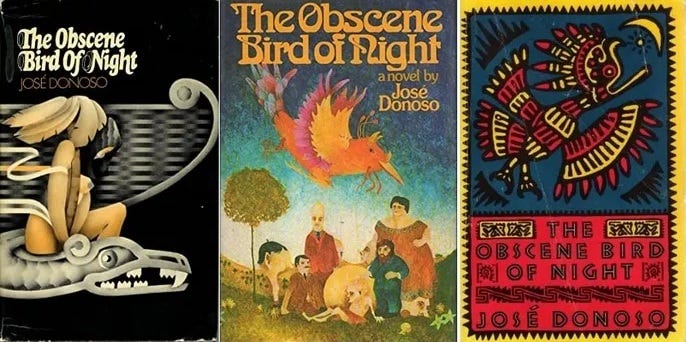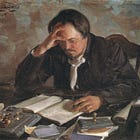Go read Cavadonga by Pablo Báez and then read my critique and then José Donoso’s 1970 novel, The Obscene Bird of Night. I’ll wait.
Okay, I haven’t read The Obscene Bird of Night, yet, but Pablo has. I was reminded of this as I was considering today’s topic on the dreaded curse of good literary taste, because Pablo had made note of certain effects he saw present in Donoso’s book and which helped inspire Cavadonga, in an attempt to implement those effects.
Then he shared the story in the Literary Salon chat and made the fateful comment: “I’d really like some feedback, especially from you Thaddeus Thomas. I had fun implementing literary devices and certain tips I picked up from your articles.”
He wasn’t especially asking for a critique, and I’d never given one on Substack, but after reading the first half of the story, I asked if he’d willing for me to write an open critique. He said he’d be honored, if that’s what I wanted to do.
I sent him the critique that night, and when he’d read it and responded, I set it to publish the next morning. It was a quick turnaround for an essay-length critique, but Cavadonga had become my new obsession and nothing else could be accomplished until the critique was finished.
Pablo felt the way we all do after receiving feedback. Gutted. He wanted to take down the draft but resisted and come that morning, he felt inspired, and wrote to me about The Obscene Bird of Night.
I’ll tell you what I told him.1
But first, let’s take care of some business—in 5 parts:
1. Easily Manage Your Subscription
Every Section has a toggle. Toggle on the ones you want to receive and toggle off the ones you don't.
This is part of The Re:Write Series.
To choose which series come to your inbox, go to:
https://literarysalon.thaddeusthomas.com/account
2. Grab a Free Book and Support our Promotional Efforts
Book Club Reads
Mystery, Thrillers, and Suspense
Adventures in Sci-Fi and Fantasy
Treasures of Darkness
Books for Children
Tales of Terror
All Things Creepy
3. A New Private Newsletter for Bookmotion Members
I’ve opened a private newsletter to help simplify communication. Bookmotion members, please visit news.bookmotion.pro and subscribe.
4. Not yet subscribed to Literary Salon?
Some of my essays are for paid subscribers only.
Some essays are for paid subscribers only.
5. Grow your Substack!
Join the waiting list for when spots open! All you need is an eBook to give away. There’s only a cost when you decide to fill a spot. There’s neither a cost nor an obligation when you join the waiting list.
Now, let’s discuss: The Curse of Good Taste.
"What nobody tells people who are beginners... is that all of us who do creative work, we get into it because we have good taste. But there is this gap. For the first couple years you make stuff, and it’s just not that good... But your taste, the thing that got you into the game, is still killer. And your taste is why your work disappoints you."
Ira Glass
That half-remembered Ira Glass quote is what made me write this article this morning, but the quote isn’t what I said to Pablo. (Is it okay if I call you Pablo?)
He sent me a passage from The Obscene Bird of Night, and I read it, but not being familiar with the book, I couldn’t see the technique employed that he so wanted to achieve. This is what I told him:
I know you saw something and were inspired, but I see what you've done as something much more challenging than anything in those pages. The best way to ruin everything is to insist on following an initial inspiration. It's time to step back and see what you've built and what it needs. What you've built is wild. You simply need to help guide the reader in a few places.
We are inspired by what we read and we see in those pages something we want to embody as a writer, but there comes a time when our greatest inspiration should be what we’ve written and what it wants to become.
The Artist Tells a Story
As a fan of a writer’s work, we have a tendency to view the author as approaching his work the way a fan would: I want to be quirky like Charlie Kaufman. I want to be a complicated literary style like Cormac McCarthy. Then we hear them talk about their work. Kaufman isn’t trying to be quirky. He’s just trying to tell the story he wants to tell in the best way he knows how. McCarthy’s stylistic idiosyncrasies, as we saw in a recent essay, are about making his stories easy to read. They usually aren’t trying to be the thing they become. They’re just trying to tell a story.
There are exceptions. I believe Salvador Dali was an exception.
The first suggestion I want to take from this is to embrace our rough edges. Be who we are. Tell the truth in fiction. Kaufman isn’t trying to be quirky; he is quirky, painfully quirky. He’s like a writer, written by an early Wood Allen, who walked off the screen of The Purple Rose of Cairo and never went back. We might want to write like Kaufman, but I suspect there are many days when he’d rather be you.
It’s the cringe. Embrace the cringe. Write the cringe, and discover who you are on the page instead of desperately trying to hide it.
You Are the Artist
Well before you’ve finished the first draft, the story you’re writing, the effects you’re achieving, take precedence over what inspired you to conquer the blank page.
You are no longer trying to be something, you are something. Your work exists, and your primary goal is to understand that work and what it wants to be.
Discover all my essays on:
What Does It Mean to have Good Taste
Don’t ask me that.
Okay, fine. If you insist.
I’ve often said that there are many reasons to love a book, and each reason has those qualities it holds most important. You love books. The reasons you do will be based on a few consistent qualities of which you have become something of an authority. If you’re really into science fiction, you’re probably into a particular type of science fiction that approaches its storytelling in a particular way, and you know who does it the best. When it comes to what you love, you have good taste.
If one of the reasons you love literature is the quality of the prose, you’ll have developed good taste in the particular types of prose you enjoy the most.
Whatever they are, in the qualities that matter to you, you’ll have very high standards. The opening quote reflected on the distance between taste and artistic skill when we’re novice writers. As we grow, the distance closes, but we’re not meant to be tracing the work of other authors. We’re different people, and the qualities that sing in our work won’t always be the qualities that sing in what we’ve admired.
Learn to hear your own song.
I’ve never really considered the downside of being Samuel Beckett, James Joyce’s protege. How do you thrive under such mastery? How do you feel like you’ve achieved something worthy? Beckett did, of course, but that was never a guarantee. He could have ended up a pale imitation, trying to write in the master’s style.
Becket found himself as a writer, as something other than the protege of a master, and he had to write in French to do it. Most of us aren’t literally in that position, but metaphorically, we all are. We are learning from the masters, but we become our own masters when our work becomes its own thing.
— Thaddeus Thomas
Weekly Flash Fiction for Paid Subscribers—these won’t be emailed to you, but you’ll find the link in my regular posts. Here’s the beginning of a flash serial: Forgotten Blood.
Okay. Not literally all of this. I didn’t write him another essay.





Excellent insight as always. I really feel more well rounded after reading these. Especially in the way you talk about becoming the master of self, the master of your own voice. I think it’s powerful stuff that every writer should hear. Oh also “embrace the cringe” is exactly what I needed as I’m writing a current project that really does make me feel like my writing is so corny. (Romance is not my passion) but I’m trying. And it’s important to know those parts of yourself. Dope words. Dope feedback.
This is something I needed to read. I do get lost in the insecure gap of my skill and that of the one’s I admire, coupled with the drive to overcompensate the fact that I feel like a lack the education most of the people here have.
Impostor syndrome in part. Even though I know the education point is in my case irrelevant, as pointed out by the frighteningly good writer @Clancy Steadwell in his publication chat, I can’t ignore the fact it’s a never ending intrusive thought.
Ultimately, my own song, sound, is what I want.
So thank you for the work you do. It’s inspiring. Serves as a guide for those of us that don’t know where or what to look for.